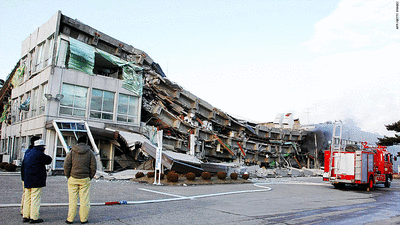Those would be the facts. Accurate as they are, however, they aren't terribly useful right now -- not to millions of survivors caught up in the catastrophe, and not to those of us striving to learn from it.

The "disaster" here isn't an earthquake or a tsunami. It's unchecked HazMats, both chemical and biological, and fires raging out of control. It's shortages of fuel and food, fouled water supplies and squashed commerce. Where the power grid isn't in shambles, rolling blackouts have been employed. Communications and transportation systems either are damaged or have been taken off-line.
It's tens of thousands of people living as refugees in their own land. It's an infrastructure overwhelmed by forces of nature and undermined by compromises in design. It's an already-ailing economy, the world's third-largest, dealt a crippling blow.
What happened in Japan? A civilized, high-tech, First World nation has been sent careening madly toward collapse.
From a preparedness perspective, causes matter less than effects. Once we've catalogued our threats (surveyed "the lay of the land," if you will) and determined specific needs (like potassium iodide tablets), we prepare to be as self-sufficient as possible in the face of present difficulty, regardless of what caused the difficulty.
Circumstances will dictate whether we shelter-in-place or bug out, but the basics -- mindset, shelter, water, security, mobility, fire, food, health, communications and commerce -- apply in any case. The reason for executing our plan becomes virtually irrelevant.
And so we prepare primarily not for causes but for the aftermath, provided that we're lucky enough to have emerged from the original calamity -- and then we adapt to that aftermath, whatever form it takes. I'm sure that a survivor in Sendai today, for example, would agree with Jim Hanks, who escaped US Airways flight 1549 after it splashed into the Hudson River two years ago:Survival is complex and cumulative. Outcomes are the result of actions building on actions. We survive one moment at a time, standing on a foundation of choices we've made.
Much is made of Japan's "culture of preparedness." Given the seismic threat, it's true that the Japanese people and their government are more involved and aware than, say, their American counterparts. Still, as I've watched events unfold over the last several days, it's obvious that survival -- and therefore preparedness -- is an inarguably individual endeavor.
Another thing that's clear (like we didn't know this already) is that we can count on the authorities to soft-pedal the scope, severity and impact of catastrophic events. That's actually wise, in a way -- most people panic when delivered an awful truth, and panic kills. A strategy of placating and appeasement requires fewer body bags.
With that in mind, we should act from our own experience and trust our instincts.
Just two more observations before I close. First, any American naive enough to believe that "it couldn't happen here" is on notice -- it can.
Second, if I turn on CNN again and have the misfortune of seeing Ryan McDonald, an American teacher living in Japan, whine one more time about having only a bottle of water and a cup of rice noodles in 12 hours -- 12 hours! The agony! -- I swear I'm gonna hurl.
Mr. McDonald needs to pour himself a tall glass of shut the hell up and spend some time with this photo:

"One of the things I discovered is that in a situation like this, you have to survive more than once."


